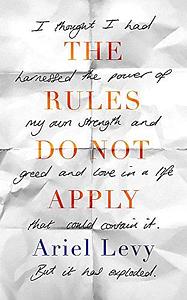Take a photo of a barcode or cover
Hmmmm. The writing was excellent, the kind that comes from someone who was born to spin words out of air. But this was more of an extended essay, didn’t have enough story on its bones to be a fully formed memoir. Also the brand of white-privilege-feminism Levy subscribes to is exhausting and stale. I’m squarely in the middle with this one.
emotional
reflective
fast-paced
One of the best memoirs I’ve read in some time, Levy’s weaving of stories is fantastic and compelling. Very applicable to my life right now, for multiple reasons. I very much enjoyed this book.
Really compelling story, very well told. Lost a star for continually misgendering and dead-naming a trans person when talking about them in the past tense. Also some weird internalized-homophobia about not wanting to call the woman she married her wife?? But otherwise very well written. (I recommend the audiobook!)
I went into "The Rules Do Not Apply" without really knowing what I was getting into. What I found was something that spoke a lot to the female experience through the eyes of Levy's specific experiences. I loved that Levy has an extremely straight-forward, yet at times poetic, way of saying things. There were a few spots I found this problematic, but by the end, I liked how she weaved her life together to connect specific moments of her narrative together. I just genuinely felt for Levy throughout her experiences and appreciated her boldness throughout.
Listened to this on a long commute. I found myself drawn in from the Levy's first words (she narrates the audio version). I found myself laughing at times, and was close to tears at other times. I could relate on some levels and hope to never relate on others.
I struggle with how to rate memoirs like this. Giving an "average" rating for the way someone poured out their heart and shared their losses seems petty.
And a lot of this writing was really beautiful--the type that makes you want to believe you can write well too.
Still, I'm saying three stars because while I enjoyed reading it, I don't think it's something that I'll be ruminating about two weeks from now. It was an interesting, emotional read about Levy and her experiences, but it didn't necessarily resonate with me.
**I won a copy of this book in a goodreads giveaway**
And a lot of this writing was really beautiful--the type that makes you want to believe you can write well too.
Still, I'm saying three stars because while I enjoyed reading it, I don't think it's something that I'll be ruminating about two weeks from now. It was an interesting, emotional read about Levy and her experiences, but it didn't necessarily resonate with me.
**I won a copy of this book in a goodreads giveaway**
It's a memoir of her life - as memoirs are wont to be - but more so it's a memoir of storytelling. She admits this throughout the book, though not directly; her job, her calling, is to draw a cohesive narrative out of thin air. So in the last few chapters, when the writing seems to come unraveled, it's clear she hasn't gotten the distance to weave them tightly into her own life story yet; they are loosely tacked where they belong - which is just life - but it comes as a let down to the reader after 175 pages of near-perfect storytelling that seemed to be barreling towards a capital-C Conclusion.
I'm muddling over this one. I've read the piece "Thanksgiving in Mongolia" that was a catalyst for this book multiple times - first in the New Yorker, then in the Best American Magazine Writing, and now here. What gripped me on those reads still makes my heart ache. Ariel Levy is brutally honest and yet her writing is lyrically beautiful as she describes delivering - and losing - a child at 5 months in a hotel room in Mongolia. This memoir expands on that experience (her blunt, though still gorgeously written, assessment of her ongoing grief is in the preface) but it also has a lot more that I'm not sure I loved. She writes herself critically; Ariel Levy as a character is not particularly likable. But ultimately she drew me in, by showing how easily the small fractures and breaks in our day to day existence can crash to the ground in an instant, and by showing that the fiercely and aggressively independent lives we craft for ourselves in modern America are often a house of cards, just waiting for the breeze that does us in. I didn't often like her but this book, though devastating, is incredibly relatable.
I admire Levy's writing and honesty in her memoir. Her message was poignant: no matter your success, and how resolutely you plan your life, in truth you have no control over the outcomes.
"Until recently, I lived in a world where lost things could always be replaced. But it has been made overwhelmingly clear to me now that anything you think is yours by right can vanish, and what you can do about that is nothing at all. The future I thought I was meticulously crafting for years has disappeared, and with it have gone my ideas about the kind of life I'd imagined I was due."
I read her other nonfiction book years ago, and remember admiring her unique take on feminism and bravery to share it. I had no context for the events of her life, so reading about their progression was at times heart-wrenching.
Reading her memoir, it seemed to me that (despite her status as a journalist), she didn't empathize much with the people around her in her life. And, as she said in her opening preface, she felt deserving of certain things. But part of her growth was learning what she couldn't control, and that the people around her had their own narratives.
"My competent self...so perspicacious, always looking for opportunities, adventures, glory, always trying to protect me from defeat - had been crushed. The wide-open blue forever had spoken: You control nothing."
I found it very interesting that she profiled the lives of others as a reporter and traveled the world throughout her life, but it wasn't until she encountered deeply personal tragedy that this idea sunk in.
I did find her memoir to be insightful, and imagine I might interpret it differently years from now depending on the outlay of my own life.
"As everything else has fallen apart, what has stayed intact is something I always had, the thing that made me a writer: curiosity. Hope."
"Until recently, I lived in a world where lost things could always be replaced. But it has been made overwhelmingly clear to me now that anything you think is yours by right can vanish, and what you can do about that is nothing at all. The future I thought I was meticulously crafting for years has disappeared, and with it have gone my ideas about the kind of life I'd imagined I was due."
I read her other nonfiction book years ago, and remember admiring her unique take on feminism and bravery to share it. I had no context for the events of her life, so reading about their progression was at times heart-wrenching.
Reading her memoir, it seemed to me that (despite her status as a journalist), she didn't empathize much with the people around her in her life. And, as she said in her opening preface, she felt deserving of certain things. But part of her growth was learning what she couldn't control, and that the people around her had their own narratives.
"My competent self...so perspicacious, always looking for opportunities, adventures, glory, always trying to protect me from defeat - had been crushed. The wide-open blue forever had spoken: You control nothing."
I found it very interesting that she profiled the lives of others as a reporter and traveled the world throughout her life, but it wasn't until she encountered deeply personal tragedy that this idea sunk in.
I did find her memoir to be insightful, and imagine I might interpret it differently years from now depending on the outlay of my own life.
"As everything else has fallen apart, what has stayed intact is something I always had, the thing that made me a writer: curiosity. Hope."






